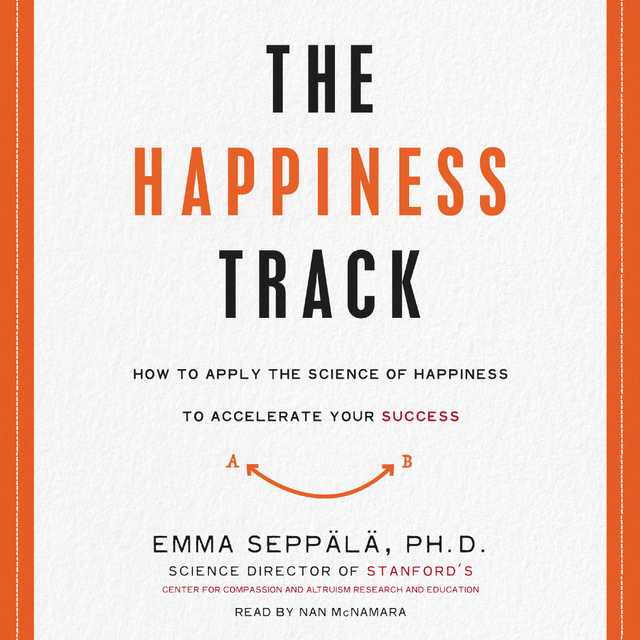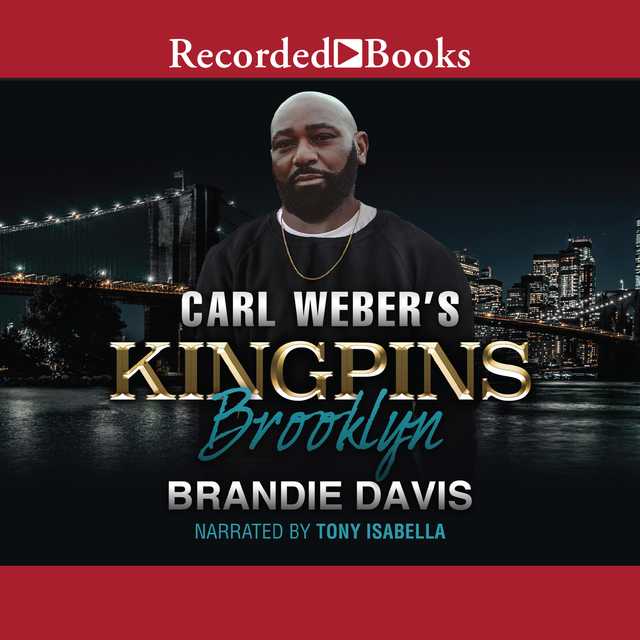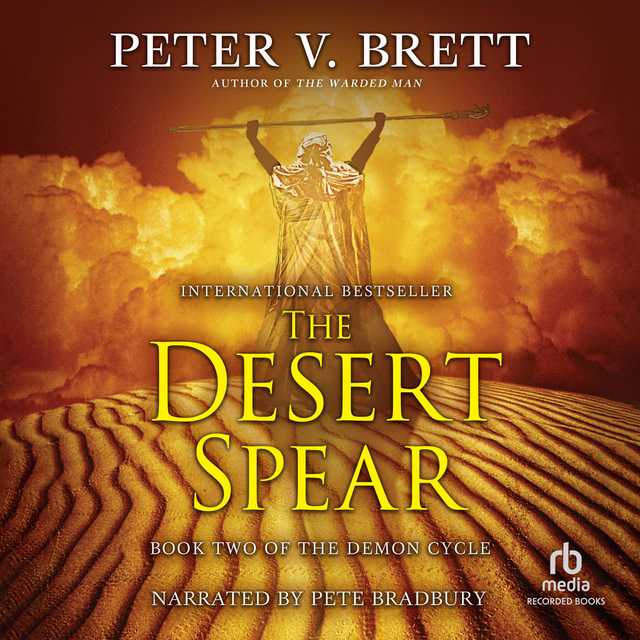The Happiness Track Audiobook Summary
A leading expert on health psychology, well-being, and resilience argues that happiness is the key to fast tracking our professional and personal success.
Everyone wants to be happy and successful. And yet the pursuit of both has never been more elusive. As work and personal demands rise, we try to keep up by juggling everything better, moving faster, and doing more. While we might succeed in the short term, it comes at a cost to our well-being, relationships, and, paradoxically, our productivity. In The Happiness Track, Emma Seppala, the science director of the Center for Compassion and Altruism Research and Education at Stanford University and director of the Yale College Emotional Intelligence Project, explains that our inability to achieve sustainable fulfillment is tied to common but outdated notions about success. We are taught that getting ahead means doing everything that’s thrown at us (and then some) with razor-sharp focus and iron discipline; that success depends on our drive and talents; and that achievement cannot happen without stress.
The Happiness Track demolishes these counter-productive theories. Drawing on the latest findings from the fields of cognitive psychology and neuroscience–research on happiness, resilience, willpower, compassion, positive stress, creativity, mindfulness–Seppala shows that finding happiness and fulfillment may, in fact, be the most productive thing we can do to thrive professionally. Filled with practical advice on how to apply these scientific findings to our daily lives, The Happiness Track is a life-changing guide to fast tracking our success and creating the anxiety-free life we want.
Other Top Audiobooks
The Happiness Track Audiobook Narrator
Nan McNamara is the narrator of The Happiness Track audiobook that was written by Emma Seppala
EMMA SEPPÄLÄ, PH.D., is the science director of the Center for Compassion and Altruism Research and Education at Stanford University, the founder of the popular news site Fulfillment Daily, and a frequent contributor to Harvard Business Review and Psychology Today.
About the Author(s) of The Happiness Track
Emma Seppala is the author of The Happiness Track
More From the Same
- Publisher : HarperAudio
- Abraham
- American Gods [TV Tie-In]
- Dead Ringer
- House of Sand and Fog
- Prey
The Happiness Track Full Details
| Narrator | Nan McNamara |
| Length | 5 hours 58 minutes |
| Author | Emma Seppala |
| Category | |
| Publisher | HarperAudio |
| Release date | January 26, 2016 |
| ISBN | 9780062373717 |
Subjects
The publisher of the The Happiness Track is HarperAudio. includes the following subjects: The BISAC Subject Code is Personal Growth, Self-Help, Success
Additional info
The publisher of the The Happiness Track is HarperAudio. The imprint is HarperAudio. It is supplied by HarperAudio. The ISBN-13 is 9780062373717.
Global Availability
This book is only available in the United States.
Goodreads Reviews
Rachel
February 06, 2017
Lately, I’ve been on a happiness-books-binge. That’s to say, I’ve been reading a whole number of books on the topic of happiness. Call it a personal fascination, a subtle midlife-crisis, or whatever, but I’ve been fascinated by what research says we need to do (or think) to become happier. The Happiness Track fits into this category, though it’s a little different. That’s because this book isn’t aimed at showing you how to become happier in itself, but at showing you how increased happiness will make you more successful. As the book’s subtitle states: ‘How to apply the science of happiness to accelerate your success’. The book delivers on this premise. Author Emma Seppälä makes a compelling case that unlike what many of us believe (and are lead to believe) being successful doesn’t make us happier. It’s the other way around: being happier makes us more successful. She makes a powerful argument against the beliefs in American society and culture especially, that success is the key to happiness, that that success comes at a price (stress, isolation), but if only we keep persevering and focusing on accomplishing even more, we will ultimately become happy. Instead, she argues, happiness leads to more success and she proposes six keys to get happier and more successful:1. Live and work in the moment: the thought is here to be present instead of dwelling on the past or worrying about the future.2. Tap into your resilience: this is about training your nervous system to bounce back from overdrive (stressful situations). 3. Manage your energy: the concept of being ‘calm’ with deliberate high-energy moments. 4. Do nothing: stimulating your creativity by being idle, diversifying your interests, and making time for fun and play. 5. Be good to yourself: exchanging a highly self-critical approach with self-compassion. 6. Show compassion to others: don’t ‘look out for number one’ but show kindness and compassion to those around you. Because I’ve read quite a bit on this topic, not all of this was groundbreaking or even new. That being said, the book is well-structured, well-written and every single statement is backed by research—something that’s not always the case with this topic. I did learn some fascinating new concepts, for instance the importance of the breath and how you can use your breath to calm yourself. The whole chapter on tapping into our resilience was fascinating, since it shows a fresh approach to dealing with stress that’s highly practical. The Happiness Track is a solid addition to the vast literature on becoming happy, or at least happier, and offers solid insights into the relationship between happiness and success. Recommended reading for anyone interested in changing their path to success.
Meredith
July 20, 2016
The following is a list of lies we like to tell ourselves in the hope that we'll become more successful:-Never stop accomplishing.-Always look out for number one.-Power through!-Play to your strengths.-Always be thinking about what comes next.-Excitement and high-intensity positive emotions are a sign that we or our colleagues are successful.Seppala has spent years deconstructing these myths and others during her research to find out what fosters happiness, and why so many of us seem to be incapable of achieving it. In The Happiness Track she explores how in the West, our culture and our learned attitudes about ourselves are often major obstacles standing in the way of our own success and happiness.If you've ever wanted to justify spending time screwing around at work, then my friends, this is the book for you. It turns out that in order to remain engaged, level-headed and innovative, you can't force creative brilliance by simply working or thinking harder. Seppala argues that the most successful and brilliant people are those who allow themselves to be idle and alone with their thoughts, and this is especially true during periods of high-stress, such as when a major deadline nears. So if you're reading this right now and on your 4th cup of coffee because you just have to finish That Big Thing you're doing, stop. Go sit outside and color a picture or lie down and do nothing for 30 minutes. (Oh, and for heaven's sake, shut off your phone!)Seppala also argues that it's important we make time to do things that have absolutely nothing to do with our jobs. If you want to be a better accountant/engineer/astronaut/whatever it is that you are, then go ahead and use your vacation time to go to your LEGO enthusiast conference, make YouTube video mashups on the weekends instead of checking your email, or put off that project that's not due right away to learn how to salsa dance. People don't have innovative and successful ideas by doing only career-related things.Most importantly, she points out that we just need to be kinder to ourselves and others. Forgive yourself when you make mistakes. Try again if you fail. Don't be so hard on yourself. If you can learn to treat yourself with compassion and forgiveness, then you can spread that culture to others, making them feel valued, supported and uplifted. The best people to work with and work for are empaths, so if you're not already treating your colleagues with kindness and acceptance, today is the day to start. You'll find that their loyalty to you will know no bounds, and everyone will live happier, more fulfilled lives as a result.
Book
January 28, 2016
‘The Happiness Track’ written by Emma Seppala is nicely written book full of life wisdom, an interesting self-help title about happiness that can be recommended for reading in couple of sittings and then every so often come back.The book is divided into several chapters each full with numerous helpful advices how to feel better in your life, how to make changes in order to make your life more optimistic and more positive. Also Emma Seppala did not forget to discuss six common myths of success, that though spread all over as common truths are actually incredibly flawed – e.g. you can’t be successful without stressful life.The author also emphasized the importance of finding happiness in adversity and staying happy even when things are not going as we would like - still, push hard trying to keep smile on your face.Only change that comes from within us can help us to feel better because things never happen by themselves, all alone. Therefore Emma Seppala gives advices to reader not only on how to be become good in something we chose as our profession, but how to stay what we truly are — enjoying the process of change to start living the life full of love and appreciation which in the end inevitably leads to the path of happiness.One of the reasons you would read it quickly is Emma Seppala’s writing style - beautiful in its simplicity and her work apart from being wise it's also easy and pleasant to read.Therefore ‘The Happiness Track’ can be recommended to anyone who wants to make positive changes with own life, reminding ourselves how to reach happiness - with help of author this journey should be much shorter.
Sanford
July 20, 2022
What are the key ideas?http://knowledge.wharton.upenn.edu/ar...Debunking the 6 myths of success and happiness:Falsehood 1: To achieve more and stay competitive, you've got to quickly move from one to-do to another, always keeping an eye on what's next.Truth: Stop chasing the future - live in the presentStep out of overdrive and tap into your natural residence. Don't multi-task. One thing at a time. Focus on 1st things 1st.Falsehood 2: You Can't Have Success Without StressTruth: If we prioritize our well-being, we actually end up being more productive, performing better, having better relationships with others, which translates into far better outcomes i.e. happiness is not the outcome of success but rather its precursor.Falsehood 3: Spend every drop of mental energy you have to stay on task despite distractions and temptations.Truth: Manage your energy not your timehttps://hbr.org/2007/10/manage-your-e...We believe that we can’t have success without stress. Many of us even count on that adrenaline that comes from over-caffeinating ourselves, over-scheduling ourselves, waiting until the last minute to get things done, because we believe that will make us more productive. But if you really look at the data, what long-term stress does, and we’ve probably all heard this so much, is that it really impairs not only our physical health but even our cognitive faculties, like our attention and memory, not to mention our emotional intelligence, our ability to communicate with other people in effective ways.Get more done by doing more of nothing. Meditate.Take a movement break. Exercise.4-7-8 breathing technique by Dr WeilArt of quittingFalsehood 4: Focus On Your Own NicheTruth: Instead of spending all your time focused intently on your field, make time for idleness, fun, and irrelevant interests. You will become more creative and innovative and will be more likely to come up with breakthrough ideas. Falsehood 5: Play To Your StrengthsTruth: Be good to yourself. Instead of only playing to your strengths and being self-critical, be compassionate with yourself and understand that your brain is built to learn new things. You will improve your ability to excel in the face of challenge and learn from mistakes.Falsehood 6: Look Out For #1Truth: Quality of relationships and the most important relationship of all - relationship with yourselfLove and kindness. Compassion.Longer lasting happiness = a sense of fulfillment. That is a sense of happiness derived out of a sense of purpose, social connection in positive relationships with other people and even a sense of doing something for a greater good, something beyond our own self. The way that this applies to the workplace is that we see, for example, that leaders and employees who are more supportive of others around them, in direct contrast to this theory that we have that we have to look out for number one, they end up performing better, they end up having better relationships, they end up being more charismatic, more liked. Also, their health improves, and even their longevity. There’s a lot to be said for this second type of happiness that we often don’t hear about.Also see Dr Rajagopal Raghunathan's Coursera course on 'A Life of Happiness and Fulfillment'https://www.coursera.org/learn/happin...Podcast on Happiness by Farnam Street w/ Laurie Santoshttps://podcasts.apple.com/sg/podcast...1. Be in the present (mindfulness, be conscious about how I am spending my time)2. Gratitude mindset (negative visualisation, and be grateful for what I still have) 3. Treasure my free time4. Cultivate meaningful relationshipsDo something good for others5. Healthy body (exercise + eat healthy + quality sleep) + healthy mind
Maggie
May 07, 2016
To read more of my reviews, go to http://readingandmusing.comIn The Happiness Track, Emma Seppala, (a Ph.D. from Stanford) notes that in today's society, we strive for happiness and success, but often find both unattainable. We learn that in order to be happy, we need to be successful.We grow up believing that we need to find a passion at a young age, focus solely on this passion, and work ourselves to the bone so that we can become masters in this field. We tell ourselves that the stress, anxiety and exhaustion that we feel as the result of our work-horse mentality, only means that we're on the right track.But Seppala argues that the reverse is true -- that in order to be successful, we need to be happy. In order to be happy, we need to take care of ourselves; focusing on our mental well-being, taking necessary work breaks, and remaining mindful and present throughout our every day lives.Through scientific studies, anecdotal notes, and interviews, Seppala explains just how happiness lends itself fully to success, and provides concrete methods for improving our personal day-to-day happiness factors.My colleague loves mindful meditation. He gave me this book as a result of multiple conversations about this practice, and while this book is unlike any that I would normally choose for myself, I truly enjoyed it.The chapters (and my thoughts on each) are as follows:1 - Stop Chasing the Future. Seppala notes that we're taught to always be looking forward. We're never able to appreciate our achievements, because as soon as we come close to reaching our goal, we're already looking to make progress on the next goal. We miss out on the good things happening around us now.She's right. The timelines and deadlines I've arranged for myself throughout the years are innumerable. I'm organized and I like structure, so I set goals, and deadlines in all facets of my life. As soon as I finish one thing, I have ten other tasks lined up. I never feel fully at ease in my day, because I'm always looking to make headway in endeavors I haven't yet reached. It's stressful, and I'm always tired. It's no way to live.2 - Step Out of Overdrive. Seppala states that we need to slow down. The United States is one of the most stressed out privileged nations in the world. Our anxiety costs us billions of dollars per year. 70% of mental health doctors' visits are due to anxiety and stress. This is unfortunate, but it's not any one person's fault. It's the result of a society that values competition and around-the-clock work over our health and mental well-being.I make jokes all the time about other people contaminating me with their "contagious" stress. Turns out though -- I'm right! When you're stressed, or anxious, your pheromones project this into the air. Others can literally catch your stress. No wonder Americans suffer from such significant mental health issues! And yet, we stigmatize those who reach out for help with a callous "Buck up. It's not that bad." No. Don't "buck up." Get help. You should feel welcome to take care of yourself without judgment. Our attitudes are conflicting and nonsensical.Our unhealthy need for competition, and desire to always be "on" leads to absurd amounts of multi-tasking. Because we spend so much time multi-tasking, we make mistakes, and never fully commit to the task at hand. By slowing down, we'll not only make less mistakes in the work we do, but we'll enjoy each task more, and feel less aggravation and stress.3 - Manage Your Energy. Only put your energy toward things that really matter. If the task doesn't require all of your energy, then don't give it all of your energy. Save your high intensity emotions for things that require high intensity.4 - Get More Done by Doing More of Nothing. I found this chapter so interesting. Seppala discussed how some of the most influential and innovative people of our time came up with their life-changing ideas. Guess where their bouts of genius didn't occur? At work. In their email. In a staff meeting. Sure -- these people worked hard, and tended to their emails, but they also took time out for themselves. They golfed. They fished. They took vacations. In doing these things, in giving their minds rest, they were able to recharge and rejuvenate. Then, because their brains were awake and fully functioning, they were able to tap into their creativity, and create world-altering inventions. It makes sense.5 - Enjoy a Successful Relationship With Yourself. Be nice to yourself. We live in a society that demands perfection -- and we're horrible to ourselves when we don't achieve it.Think about how terrible you feel when someone constantly belittles you. Isn't it awful? So then, why constantly belittle yourself? It's not helpful. Accept your mistakes and your shortcomings, and move on.Also, allow yourself to indulge in activities that do not play to your strengths. If you're not willing to try anything outside of your comfort zone, you're stifling your creativity.We've created a society in which failure isn't an option. People are afraid to try new things, or to take risks. Because of this, we don't even know what amazing inventions or ideas we could be missing out on. I'm not preaching at you -- to my own detriment, my least favorite thing in the world is to fail.6 - Understand the Kindness Edge. This was another of my favorite chapters. As we grow through life, we're taught "Look out for yourself. No one else will. Do what you need to do to get ahead. Don't worry about those you need to trample on your climb to the top."People who follow this mindset often find themselves burned out and alone. Their learned narcissism slowly starts to make them insane. The result of this is an intense unhappiness, and often a mental breakdown.Leaders, managers, and bosses who are kind, who take the time to listen, who worry about their employees' success, find their own success. Their employees are loyal to them, and work hard for them. Because their employees are happier to do their jobs, their work often yield incredible results.Success is the result of kindness. I'm lucky -- because I work for this type of person. Unfortunately - he's the first boss I've had who practices this methodology.Seppala also introduced different ways to achieve a sense of calm. She discussed different mindful meditation practices, yoga courses, art classes, breathing exercises, and nature retreats.As someone who is anxious, busy, and feeling "behind" much of the time, this book truly resonated with me. I took from it many different activities that I plan to incorporate into my day-to-day in order to increase my daily happiness factor.However, while I love the idea of practicing happiness and mindfulness, my concern is -- unless everyone is practicing such, will it really be possible to drive any truly positive change? For example, if you work for a boss who values overtime work, will you get fired if you say, "Nah. I'm taking today off."? I'm not sure.Either way -- I highly recommend reading this book.
Neil
May 09, 2022
This is the only book I’ve ever read by someone with two umlauts in their name. Seriously though, a few weeks after Emma and I met over Twitter, I picked up her book before getting on a plane. I read it on the flight and it’s a nice overview of the world of positive psychology research. I think I’ve read too much on the subject already so not a ton of new info but, like with most books, there were a few gold nuggets. Also, how impressive is it that she’s the Director of Stanford’s Center for Compassion and Altruism Research? I imagine that’s a department full of good people. And lots of fresh flowers. And bean bag chairs. And homemade shortbread on top of all the filing cabinets.
Swati
February 07, 2017
I usually don't read self-help sort of books but this one was different. I could identify with a lot of the situations mentioned in the book and am sure many of you will too. Her basic messages to us are echoes of ancient wisdom - look inward more, reflect, be calm from the inside, and listen. But what makes these tenets more approachable is that she gives simple ways to achieve them. She places us firmly in our technology-filled, frenetic environment and tells us how to cope with it. I think I can practice at least a couple of things she says if not all.
Diego Keller
June 21, 2019
Short but useful. Loads of research references and studies on the subject. Practical advices for the daily life.
Jaymee
April 23, 2021
A bit repetitive and slow at times. But overall some very interesting points and good information to add into your every day life.
Mark
May 22, 2018
Seppala provides six suggestions based on her extensive experience as a Psychologist, Professor, and Foundation leader. Because she provides a thorough End Notes section, it is worth the book to have a compilation of leading academic articles to back up her conclusions.Here are the six:"1. Live (or work) in the Moment. Instead of always thinking about what's next on your to-do list, focus on the task or conversation at hand. you will become not only more productive but also more charismatic. 2. Tap into your resilience. Instead of living in overdrive, train your nervous system to bounce back from setbacks. you will naturally reduce stress and thrive in the face of difficulties and challenges.3. Manage your energy. Instead of engaging in exhausting thoughts and emotions, learn to manage your stamina by remaining calm and centered. You'll be able to save precious mental energy for the tasks that need it most.4. Do nothing. Instead of spending all your time focused intently no your field, make time for idleness, fun, and irrelevant interests. you will become more creative and innovative and will be more likely to come up with breakthrough ideas.5. Be good to yourself. Instead of only playing to your strengths and being self-critical, be compassionate with yourself and understand that your brain is built to learn new things. you will improve your ability to excel in the face of challenge and learn from mistakes.6. Show compassion to others. Instead of remaining focused on yourself, express compassion to and show interest in those around you and maintain supportive relationships with your co-workers, boss, and employees. You will dramatically increase the loyalty and commitment of your colleagues and employees, thereby improving productivity, performance, and influence." (pp. 11-12)
Shashank
May 30, 2017
Ok....so here comes a book finally that as a reader & as a book lover,reviewer has made me feel inadequate & inadept on my qualifications to even give a review for this Brilliant,feel good and courageous book.Emma Seppala has just poured in all the years of meticulous research into this beautiful book on happiness & gives a very modern,scientific,rational, extensively research backed book on attaining happiness & has skillfully decovered the myths & complexes that can be very well related mostly by the working professionals.Also most importantly Emma has written the book in a style that makes you feel refreshed & light as she doesn't hammer on the principles which is the most irritating aspect of self help books.The reason why this book stands as a self-motivated help is solely due to the fact that Emma accumulates so much of research & rightfully has given a separate chapters to just the references of research papers ( ironically & rightfully at the same tym most lengthy also)....the each sentence of the book has helped me deconstruct my brains programming and has fed a new code to the Art of living.The research provides evidence to the readers & thus makes everyone (atleast me) to ease for digesting the information as most people including would like a random personal take on something do important like this subject.So great job Mam...this book has helped me a great deal...thanku very much!!!!
Alyson
July 10, 2017
Note: I wrote this as part of a book review series I started at my workplace, thus the (slight) emphasis on work.So, what is this book about?Western popular culture teaches us that in order to be successful, we must work without ceasing by using all available means to squeeze the most out of every second, including time management, multi-tasking, and stress management. We are also taught to continuously keep our focus on the next thing: the next step, the next goal, the next week, whatever may be around the corner. So why do many of us feel perpetually tired and discontented no matter how many boxes we check off? Psychologist Emma Seppälä’s research shows that these popular but mistaken notions do not lead to long-term success and in fact often undermine our happiness and well-being. If we want to be truly successful in the long term, there is a lot to say for finding happiness in our present situation. This book explains some effective ways to maximize our happiness now and therefore increase our chances of future success in work and in life.How difficult is the subject matter?Seppälä’s credentials may seem intimidating at first glance. Not only is she the Science Director of the Center for Compassion and Altruism Research and Education at Stanford University, but also she consults for Fortune 500 leaders, she has given multiple talks at TEDx, Google, Apple, and Facebook, her research has been featured in many well-known periodicals including the New York Times, the Huffington Post, and Psychology Today, and oh, by the way, she can speak French, English, and German. But for someone with such an envy-worthy résumé, Seppälä writes in a conversational style that is refreshingly down-to-earth. (You have to wonder if this is maybe part of the reason she is so widely published and sought-after for speaking engagements.) In the book’s introduction, the author lists six strategies for attaining success through happiness, and she dedicates one chapter to each strategy. Although she backs up every strategy with research findings, what stand out more are the stories she tells (both from her own experience and from the experience of others) and the practical tips and techniques she shares for how to stop running a rat race and start living a truly happy, fulfilled life. At just over 200 pages, this book is a short, fairly easy read that I think will be well worth your time.How can this book help me in my daily work?This book can help a lot with the “daily” aspect of work. Seppälä argues that by dispensing with popular notions of success that actually drain us and retraining ourselves to focus on maximizing our present happiness, we can become more productive and energetic as well as develop a better work/life balance. You may have heard some of this advice before, but if you’re anything like me, sometimes it takes compelling evidence to act on good advice—and The Happiness Track presents plenty of scientific research to back up these strategies.What’s the main takeaway?You can increase your chances of long-term success by focusing more on your present happiness.What are some key nuggets?Here are some findings that contradict what popular culture teaches us:• “Paradoxically, slowing down and focusing on what is happening in front of you right now—being present instead of always having your mind on the next thing—will make you much more successful. Expressions like ‘live in the moment’ or ‘carpe diem’ sound like clichés, yet science backs them up robustly. Research shows that remaining present—rather than constantly focusing on what you have to do next—will make you more productive and happier and, moreover, will give you that elusive quality we attribute to the most successful people: charisma.”• “In our busy and overwhelmed culture, we are often urged to manage time better. Time management apps, blogs, and workshops abound. We believe that if only we could manage our time, we would get more done and be happier. However, there are only so many hours in a day, no matter how neatly scheduled you are. A better focus—and one that few people understand—is energy management.”• “So while we believe that success stems from staying focused and being productive nonstop without a minute wasted, the truth is that success depends in large part on unfocusing, relaxing rather than working, and finding time to do nothing—opening up the space in our lives that our brains need for creative processes.”• “… self-compassion is one of the most fundamental determinants of resilience and success. Where excessive self-criticism can leave us weak and distraught, self-compassion is at the heart of empowerment.”• “The notion of ‘survival of the fittest’—often misattributed to Charles Darwin—was in fact coined by a political theorist, Herbert Spencer, who wanted to justify social and economic hierarchies. Darwin, by contrast, argued that ‘communities, which included the greatest number of the most sympathetic members, would flourish best, and rear the greatest number of offspring.’ Compassion and kindness are the actual cause of our survival over the centuries.”Any caveats?Just keep in mind that the words “happiness” and “success” mean a lot of different things to a lot of different people, and The Happiness Track offers only general guidelines for achieving these broad goals. The more effectively you can shut out what the world claims is necessary to be happy and successful and understand what makes you truly happy and what success means to you personally, the more likely you are to become the happiest, most successful version of yourself. I love how Maya Angelou, quoted in Seppälä’s introduction, puts it: “Success is liking yourself, liking what you do, and liking how you do it.”
Douglas
March 27, 2016
With ample notes to the research for going deeper, this is a solid overview of studies on mindfulness, compassion, gratitude, and creativity, and how happiness can underpin organizational and personal success. If you're a TED fan or an On Being listener, you'll find familiar content, if not hear the familiar voices. Some readers, I imagine, will want more of a self-help bent, others will want a focused look at the research, but either way, this is a good starting point. Follow this quick read with a closer look into the sources and readily available researcher interviews.
Julie
November 15, 2016
I selected this book based upon hearing the author on the Dan Harris 10 Percent Happier podcast. I must admit that I enjoyed that interview more than I enjoyed this book. Some of the key takeaways include to slow-down and be present, to spend time in non-work activities that give the mind time to rest (and to process information), and to more generally take care of yourself first and foremost. I finished this book in a couple hours, and it covers a lot of information that readers of the self-help genre probably already know. Nevertheless, I would recommend it.
Most Popular Audiobooks
Frequently asked questions
Listening to audiobooks not only easy, it is also very convenient. You can listen to audiobooks on almost every device. From your laptop to your smart phone or even a smart speaker like Apple HomePod or even Alexa. Here’s how you can get started listening to audiobooks.
- 1. Download your favorite audiobook app such as Speechify.
- 2. Sign up for an account.
- 3. Browse the library for the best audiobooks and select the first one for free
- 4. Download the audiobook file to your device
- 5. Open the Speechify audiobook app and select the audiobook you want to listen to.
- 6. Adjust the playback speed and other settings to your preference.
- 7. Press play and enjoy!
While you can listen to the bestsellers on almost any device, and preferences may vary, generally smart phones are offer the most convenience factor. You could be working out, grocery shopping, or even watching your dog in the dog park on a Saturday morning.
However, most audiobook apps work across multiple devices so you can pick up that riveting new Stephen King book you started at the dog park, back on your laptop when you get back home.
Speechify is one of the best apps for audiobooks. The pricing structure is the most competitive in the market and the app is easy to use. It features the best sellers and award winning authors. Listen to your favorite books or discover new ones and listen to real voice actors read to you. Getting started is easy, the first book is free.
Research showcasing the brain health benefits of reading on a regular basis is wide-ranging and undeniable. However, research comparing the benefits of reading vs listening is much more sparse. According to professor of psychology and author Dr. Kristen Willeumier, though, there is good reason to believe that the reading experience provided by audiobooks offers many of the same brain benefits as reading a physical book.
Audiobooks are recordings of books that are read aloud by a professional voice actor. The recordings are typically available for purchase and download in digital formats such as MP3, WMA, or AAC. They can also be streamed from online services like Speechify, Audible, AppleBooks, or Spotify.
You simply download the app onto your smart phone, create your account, and in Speechify, you can choose your first book, from our vast library of best-sellers and classics, to read for free.
Audiobooks, like real books can add up over time. Here’s where you can listen to audiobooks for free. Speechify let’s you read your first best seller for free. Apart from that, we have a vast selection of free audiobooks that you can enjoy. Get the same rich experience no matter if the book was free or not.
It depends. Yes, there are free audiobooks and paid audiobooks. Speechify offers a blend of both!
It varies. The easiest way depends on a few things. The app and service you use, which device, and platform. Speechify is the easiest way to listen to audiobooks. Downloading the app is quick. It is not a large app and does not eat up space on your iPhone or Android device.
Listening to audiobooks on your smart phone, with Speechify, is the easiest way to listen to audiobooks.






























